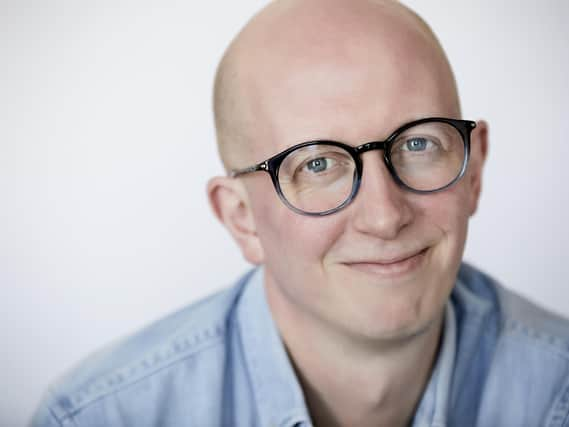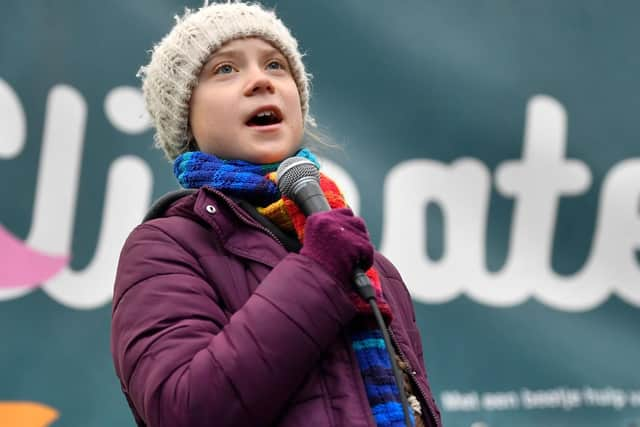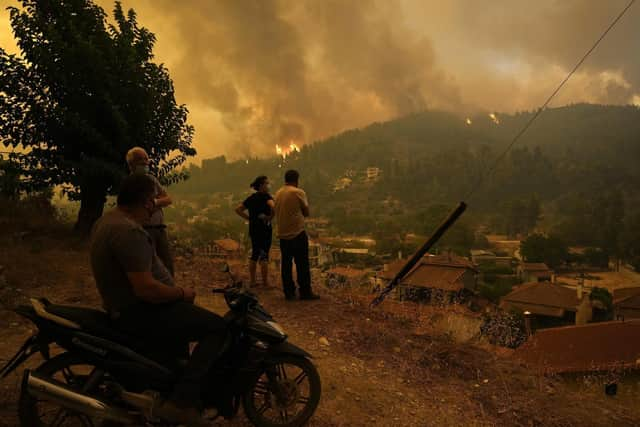How Greta Thunberg - and Yorkshire moors - inspired Piers Torday's latest climate change fiction for children


When Piers Torday was spending years painstakingly creating the fictional world that was to become the basis of his Last Wild trilogy of children’s books, he admits he often had doubts about his story of a boy able to talk to surviving pests after a deadly virus has wiped out animal populations.
But after developing the idea following a writing course in Yorkshire in 2008, Torday, who was then working as a TV producer, committed to pressing on with writing what was originally a response to the foot-and-mouth crisis as he became increasingly alarmed at the encroaching impacts of climate change and biodiversity loss.
Advertisement
Hide AdAdvertisement
Hide Ad“It was quite an odd idea with talking pigeons, a talking cockroach, set in this dystopian future where everyone has to eat this weird disgusting pink food because all of the animals have died and I was on draft 14-and-a-half and I really thought, ‘You are mad, this is a total waste of time, no one is ever going to read this’,” Torday explains over Zoom.


“But just as I would think ‘give up’, a report would come out from the World Wildlife Fund saying there had been an astonishing drop in biodiversity and over 60 per cent of wildlife since I was born in 1974 had been lost. When I read things like that I thought you have to crack on.”
The Last Wild was eventually published in 2013 and was nominated for multiple awards and published in 14 other countries. Its sequel, The Dark Wild, followed a year later and won the Guardian Children’s Fiction Prize, with the final book in the trilogy, The Wild Beyond, coming out in 2015.
Torday went on to write other books, including finishing a part-written political thriller called The Death of an Owl by his late father Paul Torday, who famously published his first book Salmon Fishing in the Yemen when he was 59.
Advertisement
Hide AdAdvertisement
Hide AdBut he has now returned to the world of The Last Wild with a prequel called The Wild Before. The book tells the story of the spread of the virus during increasingly extreme weather events from the perspective of the animals caught up in it and Torday says its themes have become uncomfortably even more relevant since he decided to return to the series two years ago.


“I wrote three books about climate change. The first is set in the British countryside, although a dystopian version. The second is a version of London looking at urban wildlife and the third really looks beyond these shores to the degradation of our seas. In three books I felt I had said quite a lot about animals, wildlife and climate change. I felt creatively I had said what I had to say.
"Then Greta Thunberg came on the scene. I was just so inspired as someone who writes for children about climate change to see this young person who had this fearless and completely extraordinary ability to speak truth to power. It was like something out of a movie – somebody who went from being a schoolgirl to standing up at Davos and speaking to the most powerful people in the world and telling them the world was on fire. But I wasn’t just inspired by her bravery, I was inspired and moved by the picture of the world she painted.
“Far sooner than I had anticipated when I wrote the first trilogy, we have moved not just into the antechamber of climate change but we are now in climate change as we can see this year.
Advertisement
Hide AdAdvertisement
Hide Ad“The massive irony is I conceived, plotted and wrote the first draft of this book in 2019 as a fable about how the virus which wipes out the animals in the first three books came about.
“I wrote about a pandemic in which animals deal with not only that but also extreme weather events like extreme heat, flooding and landslides. Now this book is coming out where we have simultaneously happening a global pandemic, extreme heat, flooding and landslides. It is no longer a warning against climate change, it is almost like an elegy to what we are at risk to losing from climate change.”
Books are 'a delayed response to foot-and-mouth crisis'
While the timing of the latest book will lead to obvious comparisons being drawn with coronavirus, Torday says the origins of the series lie with a different crisis.
“The whole series in a way is a slightly delayed response to the response to the first pandemic of the century - the foot and mouth pandemic of 2001. It completely devastated the countryside. It started in Northumberland where I am from and we forget these things but for the first time there were controls on movement. Effectively many rural areas had a mini-lockdown and there was this devastating culling of farm animals. At one point the British Army were slaughtering 100,000 animals per week. I’ll never forget the smoke billowing into the air as these animals all burnt and it felt like a very dramatic beginning to this century.”
Advertisement
Hide AdAdvertisement
Hide AdIn one scene in the new book, humans embark on a cull of farm animals in an attempt to stop the spread of the virus in a direct parallel to what happened during the foot and mouth crisis.
“There are some dark scenes in this book but the weird thing it is all real. Why I write is to try and make sense of these events. It may be 20 years after the foot and mouth crisis but I’m finally addressing it in fiction. It ha taken me that long to address the trauma. I had family members who had farms who were affected where animals were slaughtered and they were quarantined and locked down.
"It was like a precursor - we had SARS and then we had Covid. People ask when are we going back to normal but if you look at the direction of travel it is kind of in one direction. I think these things will become part of life.”
Telling children the truth - but providing hope
When he was interviewed in 2014, Torday said he imagined the events of the books taking place at the end of the 21st century. Now he says: “I wouldn’t give that answer that now, I would dramatically bring it forward.
Advertisement
Hide AdAdvertisement
Hide Ad"The trilogy is about a world where effectively democracy no longer has a place and large corporations have more influence than governments and where animals are disappearing and where climate change is a real threat to human life. I don’t want to be a Cassandra about it and I very much believe we can resolve it but that is not to lessen the gravity of the crisis.”
From the deadly heatwaves in America to fatal flooding in Belgium and Germany and terrifying wildfires in Greece and Turkey to take just a few examples from recent weeks, following the news about climate change can be daunting and dismaying for adults, let alone children.
But Torday says young people are more than capable of handling stories about the issue if they are told in the right way.
“I would never set out to write a book that would cause a child anxiety or stress but I also refuse to underestimate children because I think that is the worst mistake,” he reflects.
Advertisement
Hide AdAdvertisement
Hide Ad“Children always know when they are being condescended to and it is vitally important to tell children the truth. But there is a way telling the children the truth which also takes them by the hand and says ‘It is okay, we are going to guide you through it’.
“When I speak to children, one thing I always stress is that whilst climate change is real, amazing work is happening all the time. For every disaster story I can also point to a success story – the conservationist who has found whales people thought were extinct, of birds breeding in wetlands that weren’t breeding five years ago. It is really important to stress the positive and what can be achieved as well as things that are worrying and need to be fixed.
“I write fictional characters that have amazing characteristics to aspire to, but when you hear back from a reader who is possessed of some of those qualities, some of that determination and passion, the only word I can use for it is humbling.
“Children face a very uncertain future from climate change. I wanted to write a book that gave them hope. Even though dark things happen, it is about how hope can triumph over the grimmest of situations.
Advertisement
Hide AdAdvertisement
Hide Ad“I hope people take away two points - never to be anxious. There is a lot of talk about climate change anxiety which I understand. One response to anxiety is to be active. If you are a child and read this book and are concerned about climate change, you are never too small to make a difference. It might be writing to your headmaster about getting rid of plastic bottles in school or having a conversation with your parents about the amount they fly or the amount of meat you eat in your family. Every small difference collectively adds up the greater good. It only takes one child to be a Greta Thunberg to change the international conversation.
“But at the same time, we should never let those responsible off the hook. We could all go vegan tomorrow but as long as China is responsible for 26 per cent of global emissions, climate change isn’t going to go away. I sometimes feel governments are gaslighting us into making us feel climate change is all our problem and if we only behaved better it would all go away. Ultimately climate change will keep happening until governments pass laws and companies work for the greater social good.”
Torday adds that he knows from personal experience that changing behaviours is easier said than done.
“You can’t expect people to suddenly be perfect eco-citizens. I’m reducing plastics as much as possible from my life. I’m not a vegan but I am eating far less meat and dairy than I ever have done. I’m obviously flying far less because of the pandemic but there is an ambition to travel far less by plane. My advice to people is to change the things you can. Don’t set yourself targets and then feel guilty because you are not meeting them.
Advertisement
Hide AdAdvertisement
Hide Ad“I feel very strongly about this - especially with children. You shouldn’t feel guilty about being a human being and living on Planet Earth, you’ve just arrived here. We have got to try and work together and do what we can to try and make it sustainable for everyone else and then put pressure on Governments to create environments where life is sustainable.
“I feel talk of stopping climate change is a bit redundant now. Climate change is here and it is about how we can make life sustainable. I feel we are in for a very bumpy few years. But I do have faith in human ingenuity and resilience.
“With the books I write it is very much about changing the conversation and the culture and asking can we find a way to live in this world which is more respectful of our planet and in harmony with the planet rather than feeling it is humans against the planet which is what I feel climate change is presented as now. That is not going to be very constructive. We were born on this planet and it is a beautiful, unique sphere in the solar system. We need to find a way to live on it that is sustainable - not only for human life but the millions of other species we share it with.”
How stay in Yorkshire led to creation of series
Piers Torday originally pitched his Last Wild series as a television show before being told it would work better as a book – leading to a formative week in Yorkshire.
Advertisement
Hide AdAdvertisement
Hide Ad“I had never written a book before and in 2008 I had a free summer. I saw that Arvon, this great writing course started by Ted Hughes in the 1970s, had space open at his old house by Hebden Bridge.
“I found myself walking on the West Yorkshire moors in this beautiful August with all these thoughts in my head about animals and the foot-and-mouth pandemic. I just thought, what is this landscape without wildlife? What if we lived in a world where there were no animals left? I was there for just a week but it was one of those weeks that changes your life.”
The Wild Before is published on August 19 by Quercus Children’s.
Support The Yorkshire Post and become a subscriber today. Your subscription will help us to continue to bring quality news to the people of Yorkshire. In return, you'll see fewer ads on site, get free access to our app and receive exclusive members-only offers. Click here to subscribe.